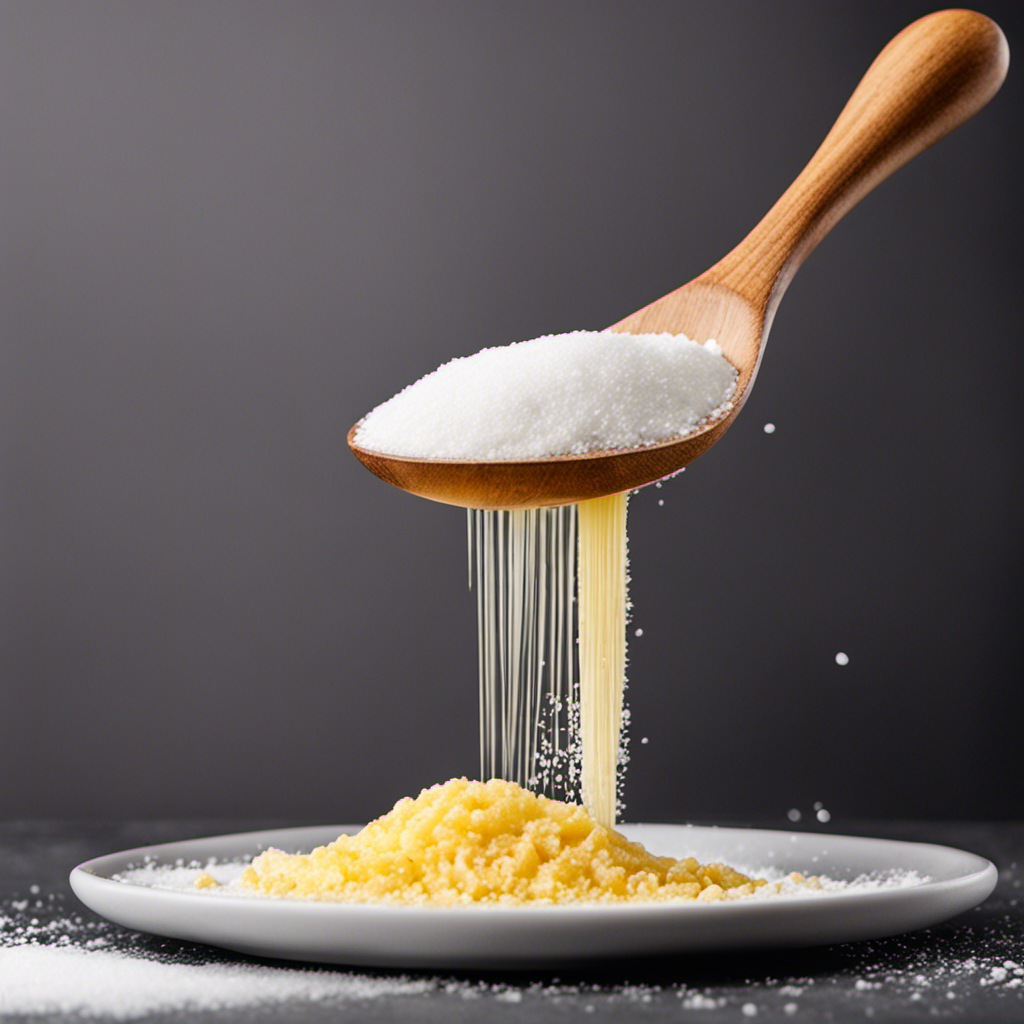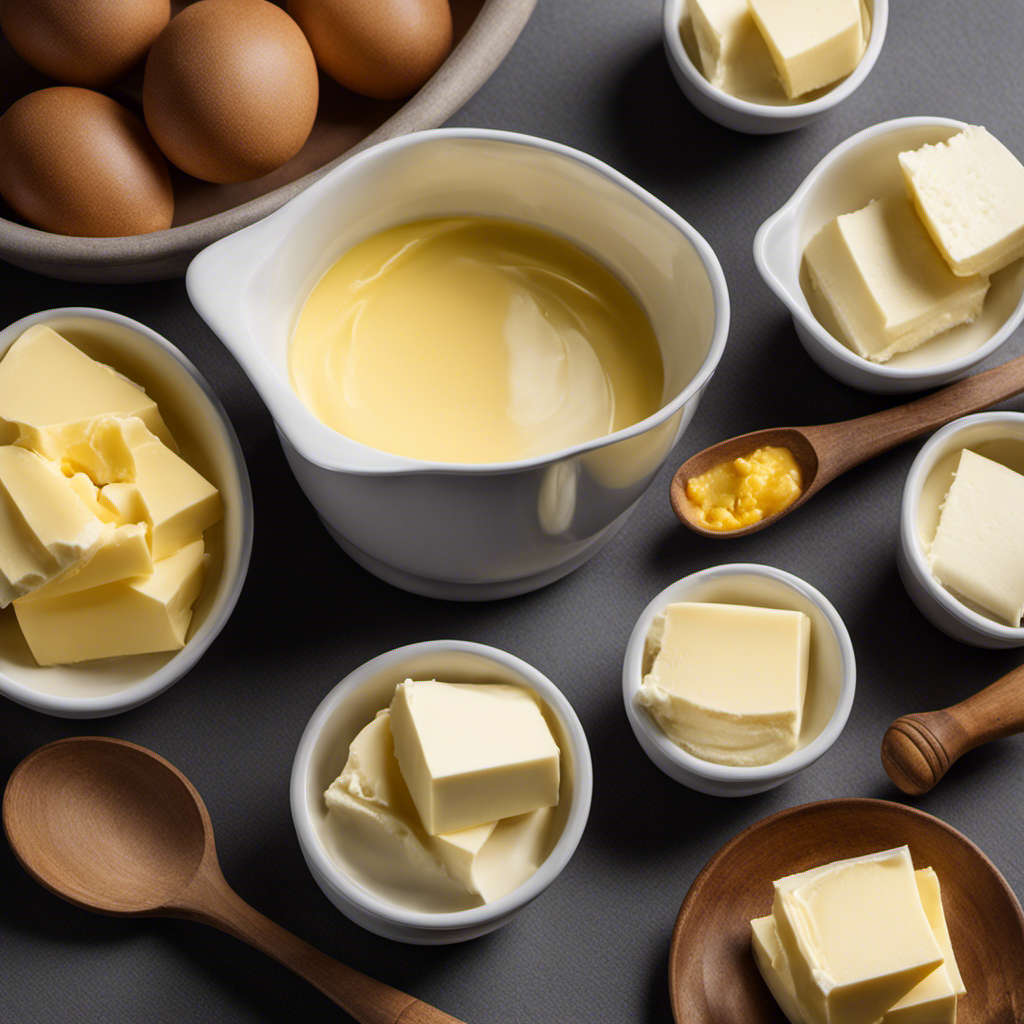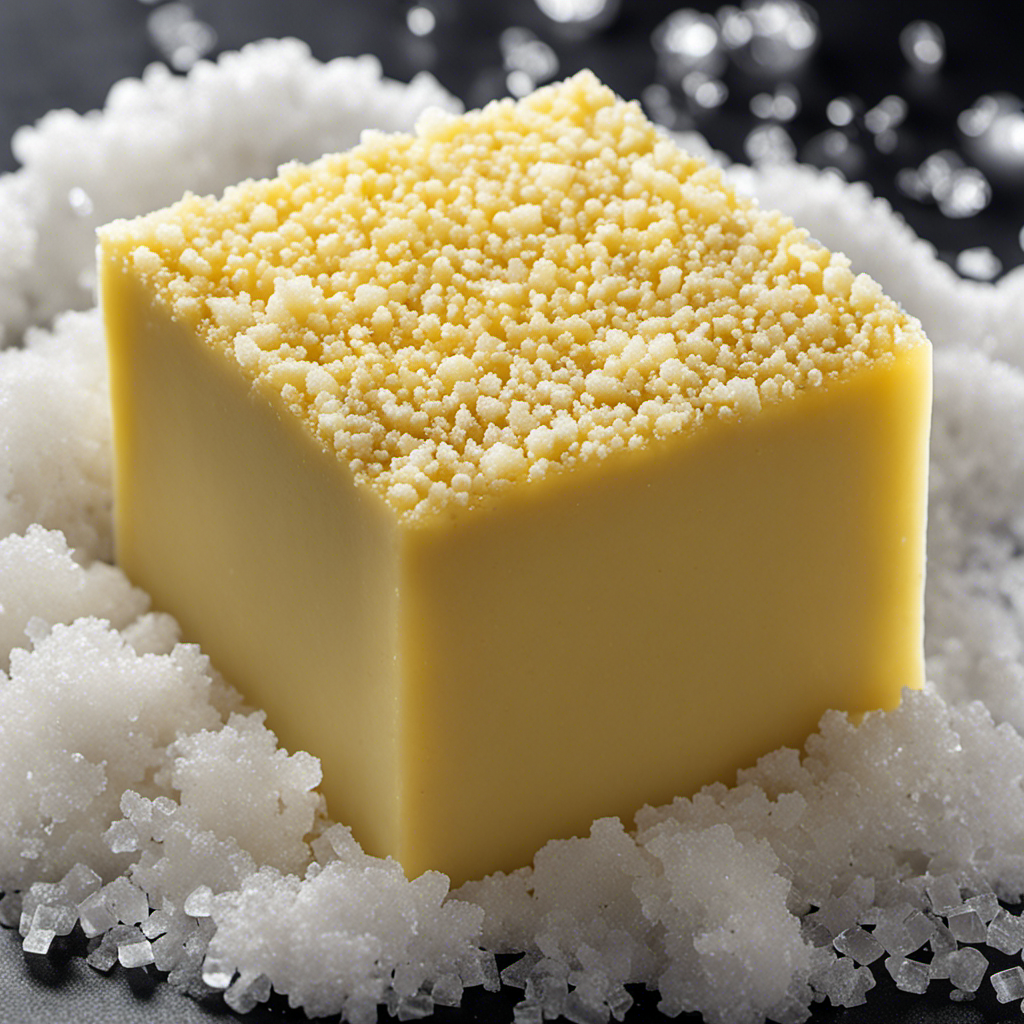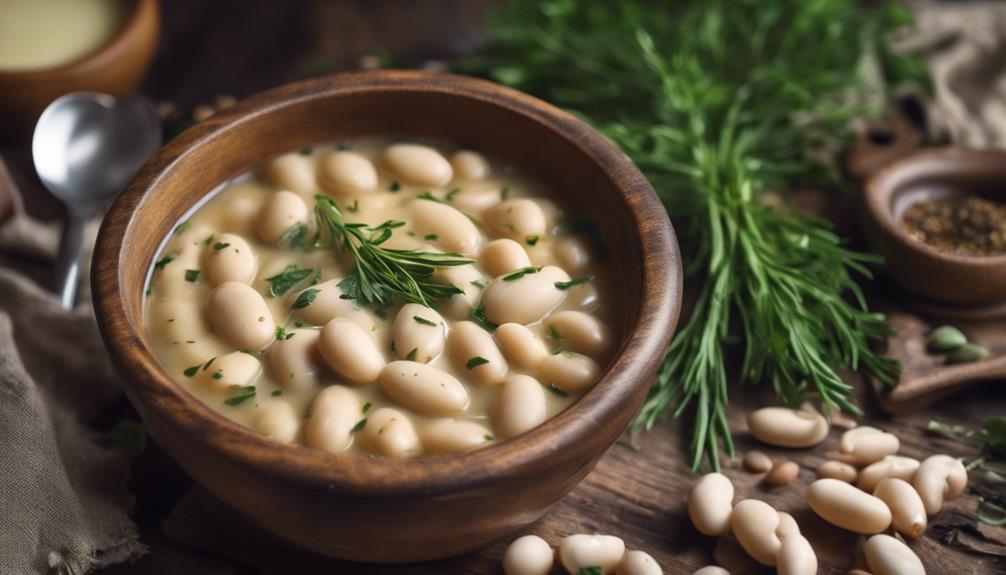Not sure how much salt to add when using unsalted butter in your baking? No problem, we have the answer for you.
In this article, we’ll explore the importance of salt in baking with unsalted butter and provide you with the perfect balance of salt measurements. We’ll also discuss different factors to consider, such as salt varieties and their impact on unsalted butter.
Whether you’re a seasoned baker or just starting out, our tips and tricks will help you season your unsalted butter with confidence.
So let’s dive in and discover how to achieve the best flavor in your baked goods with unsalted butter.
Key Takeaways
- Salt enhances the overall taste and balances the sweetness in baked goods.
- Using unsalted butter allows for better control over the salt content.
- Adjusting salt content allows for fine-tuning the flavor.
- Different dishes require different salt levels, so consider the specific recipe.
The Importance of Salt in Baking With Unsalted Butter
You’ll want to pay attention to the importance of salt when baking with unsalted butter. Understanding salt’s role in baking is crucial for achieving the desired flavor and texture in your baked goods.
While butter adds richness and moisture to your recipes, salt enhances the overall taste by balancing the sweetness and intensifying flavors. Using unsalted butter allows you to have better control over the salt content in your baked goods, ensuring that the flavors are perfectly balanced.
Additionally, using unsalted butter in baking provides a clean, neutral base, allowing other ingredients to shine.
Now that you understand the benefits of using unsalted butter in baking, let’s move on to understanding the ratio: salt to unsalted butter, and how to achieve the right balance for your recipes.
Understanding the Ratio: Salt to Unsalted Butter
When it comes to achieving the perfect flavor balance in your baked goods, understanding the ratio of salt to unsalted butter is key.
Salt not only enhances the overall taste of your baked treats, but it also helps to bring out the flavors of other ingredients.
Adjusting the salt content in your recipes allows you to fine-tune the taste and ensure that every bite is just right.
Salt for Flavor Balance
To achieve the perfect flavor balance, make sure to add a pinch of salt when using unsalted butter.
Salt serves as a flavor enhancer, bringing out the natural taste of the ingredients in your dish.
When using unsalted butter, it is important to add the right amount of salt to enhance the flavors without overpowering them.
The recommended salt quantity varies depending on the recipe and personal preference. As a general guideline, start with a pinch of salt and adjust according to taste.
You can always add more salt gradually if needed, but it is difficult to remove excess salt once it has been added.
Adjusting Salt Content
Adjusting the amount of salt can greatly impact the flavor of your dish. Finding the right balance is crucial to enhance the taste of your food.
However, if you are looking for alternatives to salt or want to reduce your salt intake for health reasons, there are various options available. Consider the following alternatives:
-
Herbs and spices: Use a combination of herbs and spices like garlic, onion, cumin, paprika, or oregano to add flavor to your dishes.
-
Citrus juices: Squeeze fresh lemon or lime juice onto your food to add a tangy and refreshing taste.
-
Vinegar: Add a splash of vinegar, such as apple cider or balsamic, to give your dish a tangy kick.
It’s important to note that while reducing salt intake can have health implications, it’s essential to consult with a healthcare professional for personalized advice.
Achieving the Perfect Balance: Salt Measurements for Unsalted Butter
You’ll need to be careful with your measurements to achieve the perfect balance of salt when using unsalted butter. When working with unsalted butter, you have the freedom to control the salt content in your recipes.
To compensate for the lack of salt, you can experiment with different salt alternatives or adjust the salt level to suit your taste. Start by adding a pinch of salt and taste the dish. If it needs more, gradually add small amounts until you reach the desired flavor. Remember, it’s always better to start with less salt and add more if needed.
Keep in mind that different dishes require different levels of salt, so it’s important to consider the specific recipe you’re working with. With careful measurement and experimentation, you can achieve the perfect balance of salt when using unsalted butter.
Factors to Consider: Salt Varieties and Their Impact on Unsalted Butter
When using different varieties of salt, it’s important to consider their impact on your recipes that call for unsalted butter. The type of salt you choose can greatly affect the flavor and overall taste of your dish. Here are some factors to consider when comparing salt varieties and their impact on unsalted butter flavor:
-
Taste: Different types of salt have varying levels of saltiness and mineral flavors. For example, sea salt is known for its mild and briny taste, while kosher salt has a more pure and clean flavor.
-
Texture: The texture of salt can also impact the final result of your recipe. Finer salts, like table salt, dissolve quickly and evenly, while larger grains, like coarse sea salt, add a delightful crunch to your dishes.
-
Impurities: Some salts contain impurities or additives that may affect the flavor of your unsalted butter. It’s important to choose high-quality salts that are free from any unwanted elements.
Tips and Tricks for Seasoning Unsalted Butter With Salt
To enhance the flavor of your recipes, it’s helpful to know some tips and tricks for seasoning unsalted butter with salt.
When it comes to adding salt to unsalted butter, start with a pinch and gradually increase according to your taste preference. This allows you to have control over the saltiness without overpowering the butter.
If you are looking for salt alternatives, consider using herbs and spices like garlic powder, onion powder, or even smoked paprika to add flavor to your butter. These alternatives can provide a unique taste profile while reducing the sodium content.
It’s important to note that excessive salt intake has been linked to health implications such as high blood pressure. Therefore, using salt alternatives or moderating your salt intake can be beneficial for your overall health.
Adjusting Salt Levels for Different Types of Baked Goods With Unsalted Butter
When it comes to cooking savory recipes, salt is a crucial ingredient that enhances the flavors of your dishes. But what about sweet treats? Can you make them delicious without adding salt?
In this discussion, we will explore the importance of salt in savory recipes and also discover alternative ways to create mouthwatering sweet treats without using salt.
Salt for Savory Recipes
You should always remember to add salt for savory recipes when using unsalted butter. Salt plays a crucial role in enhancing the flavors of your dishes, especially when it comes to soups and roasted vegetables.
Here are some key points to keep in mind:
-
Salt for Soups:
-
Adding salt to soups helps to bring out the natural flavors of the ingredients.
-
It is important to add salt gradually, tasting as you go, to avoid oversalting.
-
Remember that some ingredients in soups, such as broth or canned tomatoes, may already contain sodium, so adjust accordingly.
-
Salt for Roasted Vegetables:
-
Salt helps to draw out moisture from vegetables, resulting in a crispier texture when roasted.
-
Sprinkle salt evenly over the vegetables before roasting, ensuring that each piece is lightly coated.
-
Experiment with different types of salt, such as sea salt or kosher salt, to add different flavor profiles.
Sweet Treats Without Salt
It’s important to note that there are sweet treat recipes that can be made without using salt. While salt is often used in baking to enhance flavors, there are alternative seasonings that can be used to achieve similar results. These alternative seasonings not only add flavor but also provide various health benefits. Here are some examples of alternative seasonings and their health benefits:
| Seasoning | Health Benefits |
|---|---|
| Cinnamon | May help regulate blood sugar levels |
| Vanilla extract | Contains antioxidants and may reduce inflammation |
| Nutmeg | May aid digestion and boost brain health |
Exploring Alternative Seasoning Options for Unsalted Butter
There’s a range of alternative seasoning options you can try with unsalted butter. By exploring these techniques, you not only add flavor to your dishes but also reap health benefits.
Here are three alternative seasoning options for unsalted butter:
-
Herbs and Spices:
-
Fresh or dried herbs like rosemary, thyme, or basil add a burst of freshness.
-
Spices like garlic powder, paprika, or cumin can enhance the butter’s taste.
-
Experiment with different combinations to create unique flavors.
-
Citrus Zest:
-
Grated lemon, lime, or orange zest adds a tangy and refreshing touch.
-
Mix it with unsalted butter for a citrus-infused spread or sauce.
-
Infused Oils:
-
Add a drizzle of infused oils like chili oil, truffle oil, or garlic oil to your unsalted butter for an extra kick of flavor.
These alternative seasoning options offer a wide variety of tastes and can elevate your dishes while providing potential health benefits.
Conclusion
Congratulations! You’ve discovered the secret to transforming your baked goods from good to mind-blowingly delicious!
By understanding the importance of salt in baking with unsalted butter, you have unlocked a world of flavor possibilities.
With the perfect balance of salt measurements, you can create culinary masterpieces that will leave your taste buds dancing with joy.
So go ahead, sprinkle that salt with confidence, and prepare to amaze your friends and family with your newfound baking prowess.
Get ready for a flavor explosion like you’ve never experienced before!










